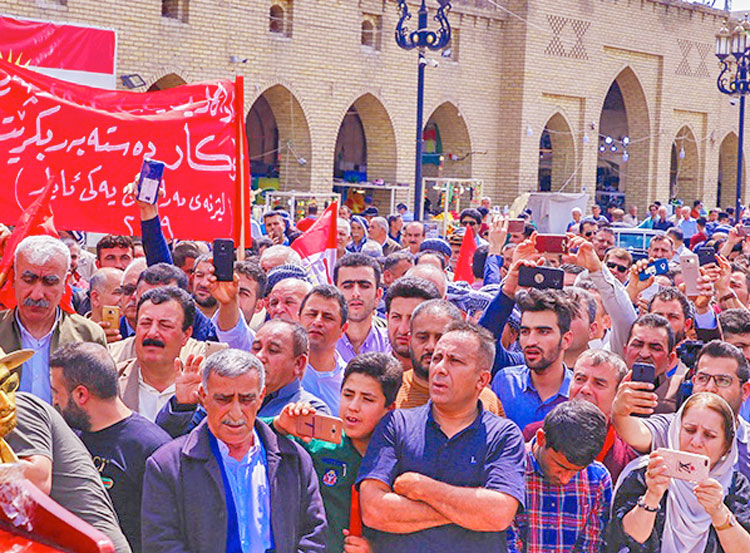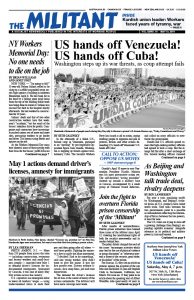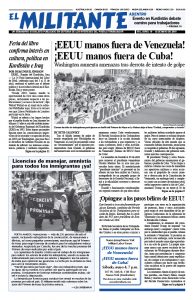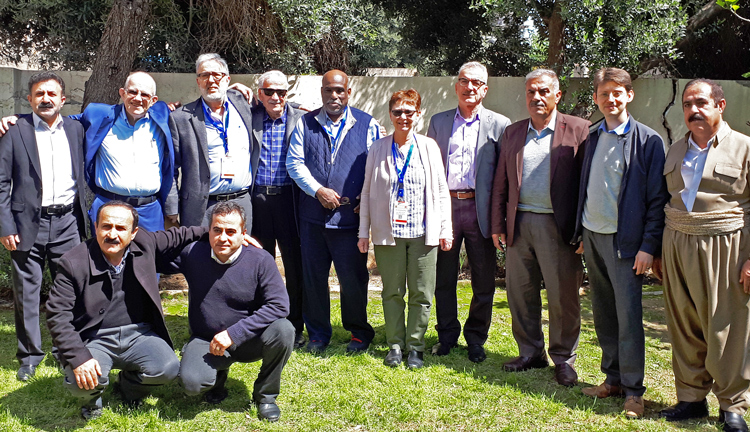ERBIL, Kurdistan Region, Iraq — “Workers here have faced decades of tyranny, war and terrorism,” Hangaw Abdullah Khan, president of the Kurdistan United Workers’ Union (KUWU), said at an April 4 meeting with a delegation of leaders of the Socialist Workers Party of the United States and the Communist Leagues of the United Kingdom and Canada.
“It’s difficult to know what to do when you face these kinds of conditions,” he said. “It makes it more difficult for workers to fight for their rights.”
Abdullah Khan was referring specifically to the decadeslong tyranny of Saddam Hussein, including the murderous attacks on the Kurdish people, and the 1980-88 war the dictatorship launched against Iran, in which hundreds of thousands were killed on both sides.
Also the U.S. imperialist rulers’ two brutal wars against Iraq in 1991 and 2003, with a decade of economic sanctions in between. Then Washington occupied the country from 2003 to 2011. The Iraqi people have lived through a campaign of terror by sectarian militias over the last decade and a half, as well as ongoing encroachments on Iraqi and Kurdish national sovereignty at the hands of both Washington and the bourgeois clerical regime in Tehran.
Under these conditions, oil production and refining, the major source of export earnings, have been set back; many industries have been shut down or destroyed; and construction is at a standstill. Hundreds of thousands of displaced workers, many of them young, are now casual workers on the streets, or have joined one or another militia to find employment.
More than 1.12 million refugees have fled to the Kurdistan Region from other parts of Iraq, including Sunni Arabs, Yazidis and Christians, as well as 250,000 refugees from Syria, 21,000 from Turkey and 13,000 from Iran.
Unions in Kurdistan Region
The KUWU is the main union federation in the Kurdistan Region organizing workers in private industry. In addition to Abdullah Khan, other union leaders at the meeting were KUWU executive board members Houree Toufeq, Nabeel Roeal Mulhem and Abed Al Qader Ahmed; Saber Othman and Omar Ismaail, president and vice president of the Erbil branch of the federation; and Maghdeed Ahmed, the founding leader of the Erbil branch and its most senior member.
They met with Steve Clark, a National Committee member of the Socialist Workers Party and editorial director of Pathfinder Press, which had a booth at the Erbil International Book Fair at the time; Alyson Kennedy and Osborne Hart, the U.S. SWP’s 2016 candidates for president and vice president; and Ögmundur Jónsson and Steve Penner from the Communist Leagues in the United Kingdom and Canada.
“The unions in Iraqi Kurdistan belonged to Iraqi federations until 1991,” Maghdeed Ahmed said. “They became independent at the time of the 1991 Kurdish uprising that led to the establishment of what is now the Kurdistan Regional Government.”
Two separate Kurdish union federations were formed, each affiliated with one of the two main capitalist parties here, the Kurdistan Democratic Party and the Patriotic Union of Kurdistan. In 2010 the unions united in a single federation. KUWU organizes workers in oil and electricity production, agriculture, metalworks, construction, transport, textile and garment, and service jobs.
Ahmed said that in 1987 Saddam Hussein ordered the dissolution of government workers unions, declaring “government employees weren’t workers, they were ‘officials.’ Since then government workers have not belonged to unions.” According to the U.N., some two-thirds of KRG residents are on the public payroll, either as government employees or pensioners. The U.N. estimates that of those in the workforce 45 percent of male workers and 75 percent of women workers are employed by the government.

“If the unions want to strike or demonstrate they need government authorization,” Ismaail said. “The unions organize May Day demonstrations each year where workers present their demands to the government.”
This year KUWU marched April 30. Kurdistan 24 TV quoted KUWU leader Saber Othman saying the union is demanding changes to KRG labor law better protecting the rights of workers. A May Day action the next day was organized by the Kurdistan Communist Party, Kurdistan Toilers’ Party, Iraqi Communist Association of Peshmerga and others.
Kurdistan 24 reported that Kurdish construction worker Pers Safeen Osman, 28, was killed May 1 when a wall collapsed on him. Over the past four years, 25 workers have died on the job and 52 have been injured, according to Arif Hito, director general of Labor and Social Affairs in the KRG.
In March 2018 thousands of government employees — teachers, health care workers, doctors and others — went on strike for several days in Erbil, Duhok, Halabja and Sulaymaniyah provinces. They were protesting wage cuts of up to half or more since 2016 by both the Iraqi central government and the Kurdistan Regional Government. In addition, the KRG had been paying them every few months rather than monthly. This was the first time the strikes extended to Erbil, the capital. Protesters were met by thousands of police and some were beaten or jailed.
Independence from capitalist state
The KUWU leaders were interested in the state of the U.S. labor movement. Clark said that Socialist Workers Party members work in unionized industries such as rail freight, as well as in large retail stores where the fight for a union lies ahead.
“The unions in the U.S. have been greatly weakened as a result of the union officials’ class-collaborationist course refusing to organize and fight unconditionally for the interests of the working class and its allies,” Clark said. Unionization of workers for private employers has fallen from around one-third in the 1950s to little more than 6 percent today, roughly the level it was at the end of World War I.
“The fight to organize the unorganized is crucial,” Clark said. “It’s tied to the battle to end the labor officialdom’s subordination of the unions to the bosses, their parties, and their government. And to the fight to end the officials’ political support for U.S. imperialism’s foreign and military policy — and its bloody and devastating wars.”
“In the 1930s the working class in the U.S. made its biggest advances in the fight to build industrial unions,” Clark said. “But those advances were undermined from the outset by the fact that on the political level the unions remained tied to the bosses’ parties. The policy of top union officials, as well as the Communist and Socialist Parties, was to support the bosses’ parties, mainly the Democratic Party. They continue to do so to this day.”
One meeting participant asked if the union leadership in the U.S. is elected by the membership or appointed. “In the United Mine Workers union that I belonged to for many years, it took a big battle in the 1960s and 1970s to win the right to vote on district and local union officials, and on our contracts,” said Kennedy, who worked as an underground miner for 14 years. That was closely tied to a far-reaching rank-and-file miners’ fight to strengthen the union so it could defend workers’ interests, such as establishment of union safety committees in the mines that could halt work in face of dangerous conditions. They also helped win coal community health clinics to treat miners and prevent deaths from black lung disease.
“One of the big challenges today is for the unions to defend the rights of nonunion workers,” she said. “There are millions of undocumented immigrant workers in the U.S. — especially from Mexico. But the union officials refuse to organize them into the unions and mobilize union power to fight for an amnesty that would lift the threat of deportation from their shoulders and give them full legal rights and equality.”
Ahmed noted that in the Kurdistan Region of Iraq “there are thousands of workers from Bangladesh, India, Iran, Turkey and elsewhere — some legal, some not — but only 5,000 have contracts. The 17,000 ‘irregular’ immigrant workers have no rights and face particularly bad conditions. But the unions defend all workers.”
History of ‘external domination’
Abdullah Khan said that “the modern history of Iraq has been one of external domination — first by British imperialism, then by the Soviet Union, and now by U.S. imperialism.”
Toufeq related an experience that vividly showed the political price paid by working people in Kurdistan and Iraq for the policies toward the Saddam regime by Moscow and the world movement it used to advance the Soviet government’s diplomatic needs and the privileged social layers whose perks and life styles it acted to defend from all comers. When Toufeq and other Communist Party cadres had been fighting the dictatorship in the mountains in the 1980s, they were attacked by Soviet-supplied helicopters firing Soviet missiles. Peasants asked them, how that could be? “You’re Communists, and we’re being attacked by Russian helicopters!”
The Soviet government supported the Saddam regime, Toufeq said, “but Communists here followed our own independent policy” toward the dictatorship. “It was very hard to answer the peasants. Working people are very confused after what they’ve gone through the past 40 years,” he said.
Toufeq said they appreciated sharing experiences with workers from other countries. “We all agree on organizing the working class. But the challenge is knowing what to do in each situation.”
Clark presented the KUWU leaders with Pathfinder books that explain the program and views of the Socialist Workers Party, including Washington’s Assault on Iraq: Opening Guns of World War III; the newly published Tribunes of the People and the Trade Unions; Are They Rich Because They’re Smart?; and Malcolm X, Black Liberation, and the Road to Workers Power, all by Jack Barnes, as well as In Defense of the US Working Class by Mary-Alice Waters. In response to a question as to whether he thought socialism was possible in the U.S., Clark pointed to Is Socialist Revolution in the US Possible? by Waters and said, “Yes. This book explains why.”
“We consider building solidarity with Kurdish unions in the U.S., the U.K., and Canada as well as vice versa to be very important,” Clark said.


